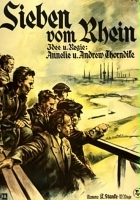| Die Sieben vom Rhein | |
|---|---|
 | |
| Directed by |
|
| Distributed by | Deutsche Film (DEFA) |
Release date |
|
Running time | 76 minutes |
| Country | East Germany |
| Language | German |
Die Sieben vom Rhein is an East German documentary film directed by Andrew and Annelie Thorndike. [1] [2] It was released in 1954. Thorndike made the film with his wife Annelie; it was made as part of the "Germans at the Same Table" campaign, and documented the visit of a West German workers delegation from the Ruhr to an East German steel factory in Riesa. [3] [4] According to author Bert Hogenkamp, "even political opponents had to admit that Andrew and Annelie Thorndike had made a masterpiece". [4]